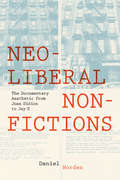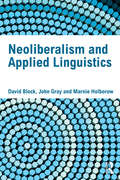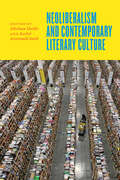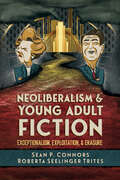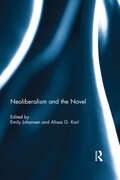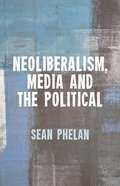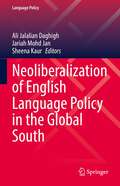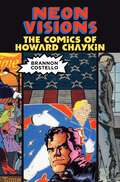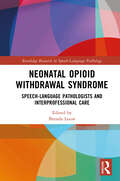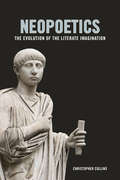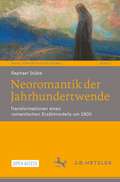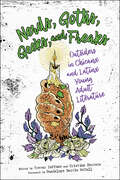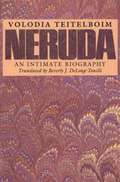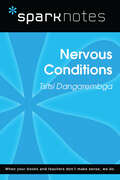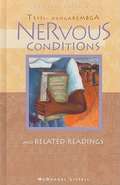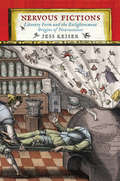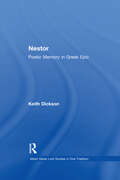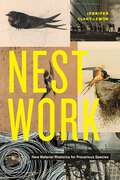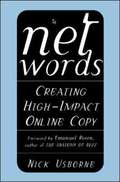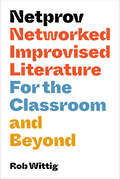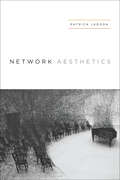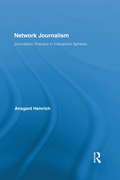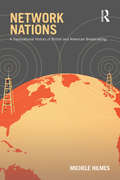- Table View
- List View
Neoliberal Nonfictions: The Documentary Aesthetic from Joan Didion to Jay-Z (Cultural Frames, Framing Culture)
by Daniel WordenWith the ascendancy of neoliberalism in American culture beginning in the 1960s, the political structures governing private lives became more opaque and obscure. Neoliberal Nonfictions argues that a new style of documentary art emerged to articulate the fissures between individual experience and reality in the era of finance capitalism. In this wide-ranging study, Daniel Worden touches on issues ranging from urban poverty and criminal justice to environmental collapse and international politics. He examines the impact of local struggles and global markets on music, from D. A. Pennebaker’s infamous Dylan documentary Dont Look Back to Kendrick Lamar’s breakthrough album Good Kid, M.A.A.D. City. He details the emergence of the hustler as an icon of neoliberal individualism in Jay-Z’s autobiography Decoded, Alex Haley’s Autobiography of Malcom X, and Hunter S. Thompson’s "gonzo" journalism. He looks at how contemporary works such as Maggie Nelson’s memoir The Red Parts and Taryn Simon’s photography series The Innocents challenge the moral simplifications of traditional true crime writing. In his conclusion, he explores the dominance of memoir as a literary mode in the neoliberal era, particularly focusing on works by Joan Didion and Dave Eggers.Documentary has become the aesthetic of our age, harnessing the irreconcilable distance between individual and society as a site for aesthetic experimentation across media, from journalism and photography to memoir, music, and film. Both a symptom of and a response to the emergence of economic neoliberalism, the documentary aesthetic is central to how we understand ourselves and our world today.
Neoliberalism and Applied Linguistics
by John Gray David Block Marnie HolborowThis book explores neoliberalism – a view of the world that puts the market at its centre- from the perspective of applied linguistics. Neoliberalism and Applied Linguistics argues that while applied linguistics has become more interdisciplinary in orientation, it has ignored or downplayed the role of political economy, namely the way in which social, political and economic factors relate to one another within the context of a capitalist economy. The authors take the view that engagement with political economy is central to any fully rounded analysis of language and language-related issues in the world today and their collaboration in this volume represents an initial attempt to redress what they perceive to be an imbalance in the field. The book begins with a discussion of neoliberalism and an analysis of the ways in which neoliberal ideology impacts on language. This is followed by a discussion of how globalization and identity have been conceptualised in applied linguistics in ways which have ignored the political centrality of class – a concept which the authors see as integral to their perspective. The book concludes with an analysis of the ways in which neoliberal ideology plays out in two key areas of applied linguistics - language teaching and language teacher education. Neoliberalism and Applied Linguistics is essential reading for advanced undergraduates, postgraduates and researchers in applied linguistics.
Neoliberalism and Contemporary Literary Culture
by Mitchum Huehls; Rachel Greenwald SmithHow has the pervasive spread of free market thinking affected contemporary literature?Neoliberalism has been a buzzword in literary studies for well over a decade, but its meaning remains ambiguous and its salience contentious. In Neoliberalism and Contemporary Literary Culture, Mitchum Huehls and Rachel Greenwald Smith offer a wide-ranging exploration of contemporary literature through the lens of neoliberalism’s economic, social, and cultural ascendance. Bringing together accessible and provocative essays from top literary scholars, this innovative collection examines neoliberalism’s influence on literary theory and methodology, literary form, literary representation, and literary institutions. A four-phase approach to the historical emergence of neoliberalism from the early 1970s to the present helps to clarify the complexity of the relationship between neoliberalism and literary culture. Layering that history over the diverse changes in a US-Anglo literary field that has moved away from postmodern forms and sensibilities, the book argues that many literary developments—including the return to realism, the rise of the memoir, the embrace of New Materialist theory, and the pursuit of aesthetic autonomy—make more coherent sense when viewed in light of neoliberalism’s ever-increasing expansion into the cultural sphere.The essays gathered here engage a diverse range of theorists, including Michel Foucault, Wendy Brown, Giorgio Agamben, Bruno Latour, Maurice Merleau-Ponty, Gary Becker, and Eve Sedgwick to address the reciprocal relationship between neoliberalism and conceptual fields such as biopolitics, affect, phenomenology, ecology, and new materialist ontology. These theoretical perspectives are complemented by innovative readings of contemporary works of literature by writers such as Jennifer Egan, Ben Lerner, Gillian Flynn, Teju Cole, Jonathan Franzen, Chimamanda Ngozi Adichie, Salvador Plascencia, E. L. James, Lisa Robertson, Kenneth Goldsmith, and many others. Neoliberalism and Contemporary Literary Culture is essential reading for anyone invested in the ever-changing state of literary culture.
Neoliberalism and Young Adult Fiction: Exceptionalism, Exploitation, and Erasure (Children's Literature Association Series)
by Sean P. Connors Roberta Seelinger TritesIn the twenty-first century, the influence of neoliberalism, the belief that society benefits when both individuals and corporations are free to maximize their talents in the service of responding to social needs and problems, resonates through all domains of human life. And yet, little critical study has been given to the reproduction of a neoliberal social order in YA literature. Neoliberalism and Young Adult Fiction: Exceptionalism, Exploitation, and Erasure examines how some YA literature naturalizes neoliberalism in positioning teenagers as self-enclosed, competitive individuals. At the same time, however, the authors also examine other YA novels as potential sites of resistance that acknowledge teenagers’ agency to reject neoliberalism’s destructive impulses and to work for social justice and equality through collective action.With that in mind, the authors of Neoliberalism and Young Adult Fiction analyze such concepts as how the exceptionality of specific characters who embody neoliberal ideals leads to self-enclosed individualism and how environmental exploitation and consumerism lead to destructive effects. The book progresses to an in-depth examination of how racism undergirds US neoliberalism and environmental exploitation. From scrutinizing racism—and the rejection of neoliberalism inherent in the antiracism movement—the study turns to an examination of gender, specifically focusing on the relationship between sexism, exploitation, and embodied rejections of patriarchal thinking. Indeed, erasure is implicated in racism, sexism, and all forms of discrimination that are borne of exploitation. Finally, youth activism—with its rejection of neoliberal ideologies—leads to a culminating chapter about how global youth link YA literature to their protest movements.
Neoliberalism and the Novel
by Emily Johansen Alissa G. KarlThe novel form has long been connected to modern capitalism and is, arguably, the literary genre most prominently enmeshed in contemporary global markets. Yet, as many critics have suggested about capital, something has changed in the last forty years. With the rise of neoliberalism as the dominant global economic rationality and mode of governance, the experience of capital has produced new ways of seeing and relating to the world, leading, as David Harvey observes, to "the financialization of everything". The novel, indexed to capital in myriad ways, then, must similarly have been transformed.Neoliberalism and the Novel investigates both those changes wrought to the novel form by changing arrangements of capital, and the novel’s broader engagement with neoliberalism itself. The chapters in this book consider these questions from a variety of angles, attending to the way in which the neoliberal novel deploys familiar generic patterns as a site from which to offer critique; examining the changing operation of labour and time under neoliberalism and its effect on novel form; and offering a broader call for new reading and interpretative practices to respond to changing socio-economic realities. This book was originally published as a special issue of Textual Practice.
Neoliberalism, Media and the Political
by Sean PhelanNeoliberalism, Media and the Political examines the condition of media and journalism in neoliberal cultures. Emphasizing neoliberalism's status as a political ideology that is simultaneously hostile to politics, the book presents a critical theoretical argument supported by empirical illustrations from New Zealand, Ireland, the UK and the US.
Neoliberalization of English Language Policy in the Global South (Language Policy #29)
by Ali Jalalian Daghigh Jariah Mohd Jan Sheena KaurThis book investigates different ways in which neoliberal language and teaching policies have influenced the English language in global south countries across Asia, Africa and Latin America. Through the three main sub themes covered by the book, namely Neoliberalism and English Language Teaching Policies, Neoliberalism Ideology as in English Language Teaching Materials, and Experiences of Neoliberal Subjects, it investigates various aspects and means through which neoliberalism is realized in a variety of contexts.Through the first subtheme the volume covers the English language education policies of Chile, Bangladesh, India, and Morocco. The second sub theme concerns how different neoliberal values such as consumerism, entrepreneurship, and individualism are localized and constructed in the locally developed English language materials of Thailand, Taiwan, Malaysia, and Vietnam. The third sub theme includes studies on the impact of neoliberalization of English in relation to Colombian, Brazilian, and Pakistani stakeholders. This book is a valuable resource for academics, postgraduate students, researchers, policy makers, educators, and practitioners who are interested in neoliberalism in English language.
Neon Visions: The Comics of Howard Chaykin
by Brannon CostelloIn the 1980s, Howard Chaykin broke new ground in American comic books with a series of formally innovative, iconoclastic works that turned the traditional action-adventure tales of mainstream comics into a platform for personal expression, political engagement, and aesthetic experimentation. His original creations American Flagg!, Time², and the notorious Black Kiss, along with his reshaping of familiar titles like The Shadow and Blackhawk, generated acclaim and often controversy as they challenged expectations of the visual design and subject matter permissible in popular comics. Today, Chaykin remains a vital and prolific artist, but despite the original and influential nature of his work, he receives scant critical attention.In Neon Visions, Brannon Costello offers the first book-length critical evaluation of Chaykin’s work and confronts the blind spots in comics scholarship that consign this seminal artist to the margins. He argues that Chaykin’s contributions are often overlooked because his comics eschew any pretensions to serious literature. Instead, Chaykin’s work revels in the cliffhanger thrills of heroic-adventure genres and courts outrage with transgressive depictions of violence and sexuality. Examining Chaykin’s career from his early successes to compelling contemporary series such as City of Tomorrow, Dominic Fortune, and the controversial Black Kiss 2, Costello explores how this inventive body of work, through its evolving treatment of the theme of authenticity, incisively investigates popular culture’s capacity to foster or constrain individual identity and political agency. Challenging prevailing assumptions about the types of comics deemed worthy of scholarly attention, Costello reveals that the work of an artist as distinctive as Howard Chaykin demands a nuanced reading—one that confronts his unique approach to the comics medium, his blending of autobiographical themes and genre trademarks, and his engagement with comic books as artifacts of consumer culture.
Neonatal Opioid Withdrawal Syndrome: Speech-Language Pathologists and Interprofessional Care (Routledge Research in Speech-Language Pathology)
by Louw, Edited by BrendaThis collection synthesizes perspectives on Neonatal Opioid Withdrawal Syndrome (NOWS), providing a comprehensive resource for those in speech-language pathology and healthcare providers working within an interprofessional approach to treat and support infants, children, parents, caregivers, and families impacted by NOWS.The volume responds to the growing challenge faced by SLPs and healthcare providers to develop new, evidence- based strategies to meet the needs of the emerging population of infants with NOWS, children prenatally exposed to opioids, their mothers, families and caregivers, in light of the growing opioid crisis in the US. Through a holistic approach, the book features contributions from researcher-clinicians across healthcare professions and from different countries. It brings together research on the impact of NOWS on child neurodevelopment, causes of neurodevelopmental alterations due to NOWS, interprofessional team care to optimize outcomes for this population, feeding, communication, sensory and motor issues, long- term outcomes into adolescence and adulthood, as well as best practices for addressing these. The volume also explores the impact of NOWS on families and effective strategies for supporting them. The Trauma Informed Care approach features throughout. The collection looks ahead to address research gaps toward enhancing evidence-based strategies from a strength- based perspective.This book will be of interest to students and researchers in speech-language pathology, occupational therapy, physical therapy, nursing, pediatric medicine, and other related fields, as well as clinicians and instructors in these same disciplines.
Neopoetics: The Evolution of the Literate Imagination
by Christopher CollinsThe quest to understand the evolution of the literary mind has become a fertile field of inquiry and speculation for scholars across literary studies and cognitive science. In Paleopoetics, Christopher Collins's acclaimed earlier title, he described how language emerged both as a communicative tool and as a means of fashioning other communicative tools-stories, songs, and rituals. In Neopoetics, Collins turns his attention to the cognitive evolution of the writing-ready brain. Further integrating neuroscience into the popular field of cognitive poetics, he adds empirical depth to our study of literary texts and verbal imagination and offers a whole new way to look at reading, writing, and creative expression.Collins begins Neopoetics with the early use of visual signs, first as reminders of narrative episodes and then as conventional symbols representing actual speech sounds. Next he examines the implications of written texts for the play of the auditory and visual imagination. To exemplify this long transition from oral to literate artistry, Collins examines a wide array of classical texts-from Homer and Hesiod to Plato and Aristotle and from the lyric innovations of Augustan Rome to the inner dialogues of St. Augustine. In this work of "big history," Collins demonstrates how biological and cultural evolution collaborated to shape both literature and the brain we use to read it.
Neopoetics: The Evolution of the Literate Imagination
by Christopher CollinsThe quest to understand the evolution of the literary mind has become a fertile field of inquiry and speculation for scholars across literary studies and cognitive science. In Paleopoetics, Christopher Collins's acclaimed earlier title, he described how language emerged both as a communicative tool and as a means of fashioning other communicative tools—stories, songs, and rituals. In Neopoetics, Collins turns his attention to the cognitive evolution of the writing-ready brain. Further integrating neuroscience into the popular field of cognitive poetics, he adds empirical depth to our study of literary texts and verbal imagination and offers a whole new way to look at reading, writing, and creative expression. Collins begins Neopoetics with the early use of visual signs, first as reminders of narrative episodes and then as conventional symbols representing actual speech sounds. Next he examines the implications of written texts for the play of the auditory and visual imagination. To exemplify this long transition from oral to literate artistry, Collins examines a wide array of classical texts—from Homer and Hesiod to Plato and Aristotle and from the lyric innovations of Augustan Rome to the inner dialogues of St. Augustine. In this work of "big history," Collins demonstrates how biological and cultural evolution collaborated to shape both literature and the brain we use to read it.
Neoromantik der Jahrhundertwende: Transformationen eines romantischen Erzählmodells um 1900 (Neue Romantikforschung #2)
by Raphael StübeDieses Open-Access-Buch beschreibt die rege Wiederaufnahme des Romantischen in der literarischen Landschaft um 1900. Es zeichnet die vergessene Diskursgeschichte einer sogenannten ‚Neuromantik‘ nach, um anschließend zu analysieren, was genau sich in diesen Texten im Vergleich zur historischen Romantik verändert hat. Die Neoromantik der Jahrhundertwende lässt sich damit als eine folgenreiche Station in der internationalen Kulturgeschichte wiederentdecken, die zugleich das Romantik-Bild des 20. Jahrhunderts entscheidend geprägt hat.
Nerds, Goths, Geeks, and Freaks: Outsiders in Chicanx and Latinx Young Adult Literature (Children's Literature Association Series)
by Trevor Boffone and Cristina HerreraWinner of the Children’s Literature Association’s 2022 Edited Book AwardContributions by Carolina Alonso, Elena Avilés, Trevor Boffone, Christi Cook, Ella Diaz, Amanda Ellis, Cristina Herrera, Guadalupe García McCall, Domino Pérez, Adrianna M. Santos, Roxanne Schroeder-Arce, Lettycia Terrones, and Tim Wadham In Nerds, Goths, Geeks, and Freaks: Outsiders in Chicanx and Latinx Young Adult Literature, the outsider intersects with discussions of race, ethnicity, gender, and sexuality. The essays in this volume address questions of outsider identities and how these identities are shaped by mainstream myths around Chicanx and Latinx young people, particularly with the common stereotype of the struggling, underachieving inner-city teens. Contributors also grapple with how young adults reclaim what it means to be an outsider, weirdo, nerd, or goth, and how the reclamation of these marginalized identities expand conversations around authenticity and narrow understandings of what constitutes cultural identity. Included are analysis of such texts as I Am Not Your Perfect Mexican Daughter, Shadowshaper, Swimming While Drowning, and others. Addressed in the essays are themes of outsiders in Chicanx/Latinx children’s and young adult literature, and the contributors insist that to understand Latinx youth identities it is necessary to shed light on outsiders within an already marginalized ethnic group: nerds, goths, geeks, freaks, and others who might not fit within such Latinx popular cultural paradigms as the chola and cholo, identities that are ever-present in films, television, and the internet.
Neruda: An Intimate Biography
by Volodia Teitelboim"Teitelboim' biography may well serve as the most important reference on Neruda' life and spirit because he maintains a historical distance between the reader and his subject. Teitelboim' Neruda is close enough to present a penetrating study of the poet, yet it is objective enough to sustain critical perspective. The book spans Neruda' career from birth until after his death, enabling the reader to glimpse the poet through the mirror of his friend. "--Journal of Third World Studies
Nervous Conditions (SparkNotes Literature Guide Series)
by SparkNotesNervous Conditions (SparkNotes Literature Guide) by Tsitsi Dangarembga Making the reading experience fun! Created by Harvard students for students everywhere, SparkNotes is a new breed of study guide: smarter, better, faster. Geared to what today's students need to know, SparkNotes provides: *Chapter-by-chapter analysis *Explanations of key themes, motifs, and symbols *A review quiz and essay topicsLively and accessible, these guides are perfect for late-night studying and writing papers
Nervous Fictions: Literary Form and the Enlightenment Origins of Neuroscience
by Jess Keiser"The brain contains ten thousand cells," wrote the poet Matthew Prior in 1718, "in each some active fancy dwells." In the seventeenth and eighteenth centuries, just as scientists began to better understand the workings of the nerves, the nervous system became the site for a series of elaborate fantasies. The pineal gland is transformed into a throne for the sovereign soul. Animal spirits march the nerves like parading soldiers. An internal archivist searches through cerebral impressions to locate certain memories. An anatomist discovers that the brain of a fashionable man is stuffed full of beautiful clothes and billet-doux. A hypochondriac worries that his own brain will be disassembled like a watch. A sentimentalist sees the entire world as a giant nervous system comprising sympathetic spectators. Nervous Fictions is the first account of the Enlightenment origins of neuroscience and the "active fancies" it generated. By surveying the work of scientists (Willis, Newton, Cheyne), philosophers (Descartes, Cavendish, Locke), satirists (Swift, Pope), and novelists (Haywood, Fielding, Sterne), Keiser shows how attempts to understand the brain’s relationship to the mind produced in turn new literary forms. Early brain anatomists turned to tropes to explicate psyche and cerebrum, just as poets and novelists found themselves exploring new kinds of mental and physical interiority. In this respect, literary language became a tool to aid scientific investigation, while science spurred literary invention.
Nestor: Poetic Memory in Greek Epic (Albert Bates Lord Studies in Oral Tradition #Vol. 16)
by Keith DicksonFirst published in 1995. Routledge is an imprint of Taylor & Francis, an informa company.
Nestwork: New Material Rhetorics for Precarious Species (RSA Series in Transdisciplinary Rhetoric)
by Jennifer Clary-LemonAs more and more species fall under the threat of extinction, humans are not only taking action to protect critical habitats but are also engaging more directly with species to help mitigate their decline. Through innovative infrastructure design and by changing how we live, humans are becoming more attuned to nonhuman animals and are making efforts to live alongside them.Examining sites of loss, temporal orientations, and infrastructural mitigations, Nestwork blends rhetorical and posthuman sensibilities in service of the ecological care. In this innovative ethnographic study, rhetorician Jennifer Clary-Lemon examines human-nonhuman animal interactions, identifying forms of communication between species and within their material world. Looking in particular at nonhuman species that depend on human development for their habitat, Clary-Lemon examines the cases of the barn swallow, chimney swift, and bobolink. She studies their habitats along with the unique mitigation efforts taken by humans to maintain those habitats, including building “barn swallow gazebos” and artificial chimneys and altering farming practices to allow for nesting and breeding. What she reveals are fascinating forms of rhetoric not expressed through language but circulating between species and materials objects.Nestwork explores what are in essence nonlinguistic and decidedly nonhuman arguments within these local environments. Drawing on new materialist and Indigenous ontologies, the book helps attune our senses to the tragedy of species decline and to a new understanding of home and homemaking.
Net Words: Creating High-Impact Online Copy
by Nick UsborneA practical guide on how to write online text that is funny, personal, engaging, and informative-in short, how to write text that people actually want to read. It gives insight on how to attract customers by online communication.
Netprov: Networked Improvised Literature for the Classroom and Beyond
by Rob WittigNetprov is an emerging interdisciplinary digital art form that offers a literature-based “show” of insightful, healing satire that is as deep as the novels of the past. This accessible history of Netprov emerges out of an ongoing conversation about the changing roles and power dynamics of author and reader in an age of real-time interactivity. Rob Wittig describes a literary genre in which all the world is a platform and all participants are players. Beyond serving as a history of the genre, this book includes tips and examples to help those new to the genre teach and create netprovs. “Jargon-free and ambitious in scope, Netprov meets the needs of several types of readers. Casual readers will be met with straightforward and easy-to-follow definitions and examples. Scholars will find deep wells of in- formation about networked roleplay games. Teachers and students will find instructions for how-to play, and a ready-made academic context to make their play meaningful and memorable.” —Kathi Inman Berens, Portland State University
Network Aesthetics
by Patrick JagodaThe term “network” is now applied to everything from the Internet to terrorist-cell systems. But the word’s ubiquity has also made it a cliché, a concept at once recognizable yet hard to explain. Network Aesthetics, in exploring how popular culture mediates our experience with interconnected life, reveals the network’s role as a way for people to construct and manage their world—and their view of themselves. Each chapter considers how popular media and artistic forms make sense of decentralized network metaphors and infrastructures. Patrick Jagoda first examines narratives from the 1990s and 2000s, including the novel Underworld, the film Syriana, and the television series The Wire, all of which play with network forms to promote reflection on domestic crisis and imperial decline in contemporary America. Jagoda then looks at digital media that are interactive, nonlinear, and dependent on connected audiences to show how recent approaches, such as those in the videogame Journey, open up space for participatory and improvisational thought. Contributing to fields as diverse as literary criticism, digital studies, media theory, and American studies, Network Aesthetics brilliantly demonstrates that, in today’s world, networks are something that can not only be known, but also felt, inhabited, and, crucially, transformed.
Network Journalism: Journalistic Practice in Interactive Spheres (Routledge Research in Journalism)
by Ansgard HeinrichDrawing on current theoretical debates in journalism studies, and grounded in empirical research, Heinrich here analyzes the interplay between journalistic practice and processes of globalization and digitalization. She argues that a new kind of journalism is emerging, characterized by an increasingly global flow of news as well as a growing number of news deliverers. Within this transformed news sphere the roles of journalistic outlets change. They become nodes, arranged in a dense net of information gatherers, producers, and disseminators. The interactive connections among these news providers constitute what Heinrich calls the sphere of "network journalism."
Network Morphology
by Andrew Hippisley Dunstan BrownMorphology is particularly challenging, because it is pervaded by irregularity and idiosyncrasy. This book is a study of word structure using a specific theoretical framework known as 'Network Morphology'. It describes the systems of rules which determine the structure of words by construing irregularity as a matter of degree, using examples from a diverse range of languages and phenomena to illustrate. Many languages share common word building strategies and many diverge in interesting ways. These strategies can be understood by distinguishing different notions of 'default'. The Network Morphology philosophy promotes the use of computational implementation to check theories. The accompanying website provides the computer coded version of the Network Morphology model of word structure for readers to test, customize and develop. This book will be a valuable contribution to the fields of linguistic typology and morphology and will be welcomed by researchers and graduate students in these areas.
Network Nations: A Transnational History of British and American Broadcasting
by Michele HilmesIn Network Nations, Michele Hilmes reveals and re-conceptualizes the roots of media globalization through a historical look at the productive transnational cultural relationship between British and American broadcasting. Though frequently painted as opposites--the British public service tradition contrasting with the American commercial system--in fact they represent two sides of the same coin. Neither could have developed without the constant presence of the other, in terms not only of industry and policy but of aesthetics, culture, and creativity, despite a long history of oppositional rhetoric. Based on primary research in British and American archives, Network Nations argues for a new transnational approach to media history, looking across the traditional national boundaries within which media is studied to encourage an awareness that media globalization has a long and fruitful history. Placing media history in the framework of theories of nationalism and national identity, Hilmes examines critical episodes of transnational interaction between the US and Britain, from radio’s amateurs to the relationship between early network heads; from the development of radio features and drama to television spy shows and miniseries; as each other’s largest suppliers of programming and as competitors on the world stage; and as a network of creative, business, and personal relationships that has rarely been examined, but that shapes television around the world. As the global circuits of television grow and as global regions, particularly Europe, attempt to define a common culture, the historical role played by the British/US media dialogue takes on new significance.
